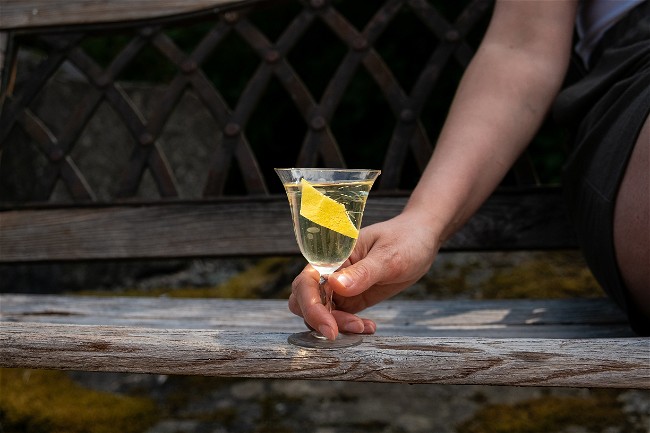Dry Gin, Dry Vermouth and Orange Bitters. Oh the Martini! Probably one of the most controversial cocktails I know of. Everybody has their opinion and preference on it. Some like it dry, some dirty, some wet, some shaken, some stirred, some with lots of vermouth, some none at all. I think it's time we discuss a little.
Skip to the recipe by clicking here.
Historically speaking, the classic martini is a mixture of gin (or vodka), dry vermouth and optionally orange bitters. The classic gin martini was traditionally made using equal parts Sweet Vermouth (yes, sweet vermouth!) and a sweet style gin called Old Tom Gin. But as the dawn of the 20th century began, the fashion for cocktails became much drier and folks wanted less and less sweetness in their cocktails. This trend was expedited by the growing popularity of London Dry Gin (over the sweeter Old Tom style) and the martini's conversion from the use of Sweet Vermouth to that of Dry Vermouth.
To appease the dry cocktail movement of the late 1800s and early 1900s, Italian vermouth makers, Martini & Rossi, released their Extra-Dry Vermouth to the American market (New Years Day, 1900), a dry vermouth so dry it's Extra-Dry! As time went on, the martini cocktail got drier and drier, to the point that when Winston Churchill was asked how much vermouth he wanted in his cocktail, Churchill replied: “I would like to observe the vermouth from across the room while I drink my martini.”
Over the ages, the Martini cocktail evolved from equal parts sweet vermouth and sweet gin, to equal parts dry vermouth and dry gin. Eventually drying out so much that vermouth wasn't even considered and the popular preference was essentially chilled and diluted gin in a fancy glass. Not a bad way to enjoy a nice gin, but a poor way to have a martini, I think, but to each their own!
In general cocktail making, spirit heavy drinks with no citrus or fruit juice are generally stirred, while drinks with juice are shaken. There are always exceptions to the rule, but that is pretty much the standard. Historically, the martini is a stirred drink. Then in 1956, Ian Fleming's James Bond declared that a martini should be 'shaken, not stirred'. This quote skyrocketed into pop culture and for many, the default method of making a martini became to shake it. This mixing method causes more dilution over stirring and additional aeration.
With these drink trends converging, it meant the martini had basically become straight dry gin, shaken on ice. That's it. Perhaps a whiff of vermouth at most. Then came the vodka martini...and now it's simply chilled water and ethanol. Yum.
Okay, okay, clearly my biased opinion as a vermouth maker is shining here, but what I'm trying to get at is, that to understand why there are so many different martini variations, you need to understand the history and make your own choices. I love a good gin chilled and diluted, and that's also a great way to sample a lovely vodka, but in my opinion that's not a martini. A martini is a cocktail and a cocktail requires more than one ingredient...unless it's a shakerato...but that's another story.
With the dawn of the modern cocktail movement, we have seen the martini get back to its roots. It makes me happy to see that in a good bar, martinis are being served with 2 parts gin to 1 part vermouth or sometimes even 50/50! Vermouth has taken its place on the stage once again and I'm all for it. It adds additional complexity to the gin, rounds off the edges and makes for a truly lovely experience. When I want a drink a little lower in alcohol content, I tend to do a 50/50 split of Dry Vermouth and London Dry Gin, but if you want to know my Martini preference, check out the recipe below.
I won't go into things here like garnishes and olive juice. Those are your preferences. I suggest trying them all! Lemon peel vs. olive vs. pickled onion, with and without olive juice. Figure out your own love for the martini. Experiment, the worst that will happen is you'll get a martini out of it!
Oh and you're probably still asking what makes this recipe the World's Best Martini? Well I happen to live in a pretty awesome place called Vancouver Island, British Columbia, which also happens to be home to both the World's Best Contemporary Gin (2019 World Gin Awards), the World's Best Varietal Vodka (2020 World Vodka Awards), AND the vermouth I created at Esquimalt Vermouth & Apéritifs won World's Best Dry Vermouth (2023 World Vermouth Awards). Whether you like your martini with Gin or Vodka, you can quite literally make it using the world's best vermouth, gin or vodka, all made on Vancouver Island! If that doesn't make this recipe the world's best, I don't know what does. But yah know, I'm biased. Enjoy!

